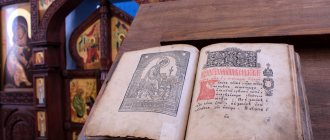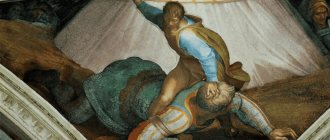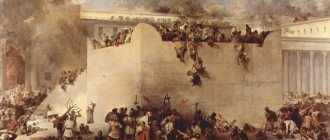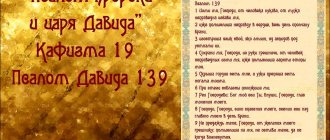Those who regularly attend services know it almost by heart. After all, it sounds during the liturgy, and in the evening when the Six Psalms and special liturgical hymns are read, as if God’s judgment on every human soul.
Briefly about the Psalter
The author of most of the liturgical hymns that the book contains is the greatest of the kings of the Jews, the ancestor of Jesus Christ in the flesh, David. The meekest, most humble, he lived a difficult life, survived persecution - first from King Saul, then from his own son. He wandered more than once, was on the verge of death - but every time he was saved by the Lord. The hymns he wrote are reflections of the human soul about sin, repentance, sorrow over infirmities, joy about forgiveness. They are so consonant with the human soul that for a long time psalms - chants intended for worship - were also sung or read during home prayer.
David cuts off part of Saul's outer robe
In addition, the Psalter, written in the Holy Spirit, is also a prophetic book, containing not only reflections on the human soul, but omens of events at the time of the Incarnation of Christ.
Author and time of writing
Much of the Psalter was written by an ancient Israeli king named David. He laid the foundation for a whole family of great patriarchs - his son was the famous Solomon, who built the Temple. It was a descendant of David (on the maternal side) that Jesus Christ became. The great ruler died around 965 BC. e.
Work as a courier at Yandex.Eda (up to 3,400 rubles per shift) leave a request →
Despite the fact that the Lord arbitrarily chose a humble shepherd to be the leader of the Jews, his life cannot be called calm. However, Psalm 102 was probably written during a quiet period. During these days, reigning David had the opportunity to reflect on the greatness of God. Most likely, this is the period of his life before the reins of power were transferred to the hands of Solomon.
When and who wrote Psalm 103?
Like most hymns, it was also created by King David - approximately 1000 years before the birth of Christ . Its text has been translated into Slavic since the 9th century, when the saints worked on it. Cyril and Methodius with their students. Thus, the Jewish text of the well-known chant is more than 3000 years old, the Slavic text that is heard now during services is more than 1000 years old.
The circumstances, as well as the exact time of writing the song, have not been established, however, biblical scholars believe that it was written during a time of peace and prosperity in the kingdom of Israel. It, however, prompted St. David’s message is not to relaxation or “resting on one’s laurels,” but to deep gratitude to the Lord for His mercies.
Text of Psalm 102
The Church Slavonic version of the prayer is considered canonical, which is why it is performed in churches during services. For personal appeal to God, this text is used by those who seek to achieve maximum proximity to Him.
Not all lay people are trained in Church Slavonic. Those who do not have special training are recommended to read Psalm 102 in Russian. In this form, its content is easier to perceive, which means the meaning of the work becomes more understandable.
With accents in Church Slavonic
In Russian
Main theme
Step by step, the singer traces how God's grace acts on a person:
- says that the Lord, who created man as a unity of soul and body, is praised not only by the spirit, but also by “the whole interior” of the person praying;
“Exactly! - St. exclaims about this. Ignatius (Brianchaninov), who experienced this state, “With the abundant action of the Jesus Prayer, all the forces of the soul, the body itself, take part in it.”
- according to the word of St. David, the Lord cleanses the sins of a person who repents to Him, heals his illnesses, mental and physical;
- at the same time, all the sins of people are nothing before His mercy: “He did not create for us to eat because of our iniquity; all this is because God treats people the way a parent treats children, accepting them with all their infirmities, as long as the person shows only a desire to change - “as a father generously gives to his sons, the Lord will provide for those who fear Him”;
- His forgiveness is complete, absolute; From now on, man’s “iniquities” are separated from him “as far as the east is from the west,” that is, they do not approach him, just as the west cannot be brought closer to the east, because these are two opposite sides of the world.
Such is the Lord - both for people and for the world of Angels . It is no coincidence that the prophet concludes the chant with the words:
“Bless the Lord, all His angels, you mighty in strength, who do His word, to hear the voice of His words. Bless the Lord, all His might, His servants, who do His will. Bless the Lord, all His works, in every place of His dominion...”
Peculiarities
Together with the next psalm 103, dedicated to the action of God’s providence among the elements of the material world, nature, wisely created by the Creator, 102 is called “paired,” since the two hymns complement each other in meaning and content. In total, there are six “paired” chants united by a common idea in the Psalter.
King David
In addition, the text of the chant contains some expressions that are difficult to understand for modern people. So, for example, it says here that thanks to Grace “your youth will be renewed like an eagle . During the time of St. David it was believed that:
- the eagle is the only bird that flies to the very sun;
- many believed that the luminary renews him, restoring his youth.
This is exactly how the words of the prophet should be understood: we are talking about spiritual renewal, the new life of the believer, which he receives from God.
The Story of King David's Sin
His parents managed to raise him as a worthy man who was devoted to the ruler. He served him faithfully and also revered the Lord. When the previous ruler died, it was he who took the throne. He was considered God's anointed one. After the death of Saul, who ruled the country for quite a long time, many were glad that his former servant would become the new ruler. Since everyone knew perfectly well that David has a gentler character, he is not hot-tempered, and respects the faith.
Due to numerous requests from readers, we have prepared an “Orthodox Calendar” application for smartphones. Every morning you will receive information about the current day: holidays, fasts, days of remembrance, prayers, parables. Download for free: Orthodox Calendar 2022 (available on Android)
It is noteworthy that it was during his reign that the church received special power. If earlier representatives of the nobility felt at ease, then after the change of king the situation changed. David completely subordinated secular life to spiritual life. In addition, it was he who abolished sacrifices.
The man was sure that no blood sacrifices could please the Lord. After all, he created every creation with love. Therefore, murder should not be encouraged. At first, this reform caused a huge resonance. Some even thought that there would be a riot and the ruler would be overthrown. However, nothing of the kind happened. Gradually people got used to the idea that sacrifices were indeed wrong. Moreover, they nevertheless realized that such rituals could not have anything to do with Christianity at all. As you know, heretics did similar things.
David was a truly wise ruler. Under his leadership, the country began to prosper. However, like any other person, he had a tendency to fall. From the very beginning, the prophets were troubled by the fact that David categorically refused to dissolve his harem. Although he was warned that a valiant Christian cannot have many wives. But the monarch remained deaf to such advice. He loved women too much. And everyone. Such love of love, sooner or later, had to become the reason for committing a sin. That's exactly what happened.
Meeting with a girl
One day, while walking through the garden, the king noticed a girl bathing. She was so beautiful that the man immediately fell in love with her. He ordered his servants to immediately take her to the palace. When they carried out the order, it became obvious that the king liked the unusual woman. She was well known in the palace. Since Bathsheba was the wife of one very famous commander, who was devoted to the king.
For many years he fought for him and never contradicted him, he carried out every order. But he categorically refused to bring his wife to the palace, because he understood that she was too beautiful and could provoke other men. And the king himself supported him. He insisted that a beautiful wife should be kept away from men.
Committing a terrible sin
But even when it became clear that the girl was married, this did not stop the king. He made her his concubine. After a few months, it became clear that the girl could not return to her husband because she became pregnant by David. Then a plan matured in the king’s head.
He ordered his faithful servants to get rid of Bathsheba's husband, who was on the battlefield at that time. Betrayed by his own comrades, Uriah was killed by the enemy army. And David took Bathsheba as his wife. Thus, he decided to hide his sin of adultery and murder of another person. Of course, he was not the one who took Uriah’s life. However, this was done precisely on his orders. Thus, it can be argued that the king committed two sins:
- adultery - knowing that the woman was someone’s wife, he still wanted to take her by force and leave her in the harem;
- betrayal – Uriah was a devoted man who served the king faithfully. He didn't even suspect what exactly he had done behind his back.
But the Lord knew about what a great sin the ruler had committed. That is why he sent a curse on his family. The king himself turned into a weak old man, whose body was covered with ulcers, and a riot began in the castle. His own sons began to fight each other for the throne. When such misfortunes began, David realized what a great sin he had committed. And at the same time he promised to redeem him during his lifetime.
From then on, he began to lead a righteous lifestyle. Moreover, he even wrote a huge number of psalms and prayers. As mentioned above, the most famous is Psalm 102.
Brief interpretation
The Holy Fathers see at least several meanings in this hymn:
- literal-historical; after all, the chant was written as gratitude to St. David for God's many blessings;
- prophetic, dating back to the time of the deliverance of the Jews from Babylonian captivity - about 500 years after David; This is noted, for example, by St. Theodoret of Cyrus, who understands the words “delivering your belly from corruption” in exactly this way;
- finally, the words of the hymn refer to the Christian life; for example, the expression “crowning you with mercy and bounties” is understood by the holy fathers as a proclamation of the coming of the Messiah, when a person will be freed from sin and given mercy.
In what cases is it read?
The 102nd is part of the 14th kathisma (part) of the Psalter. It begins with the penitential Psalm 101, called “the prayer of the poor, when he becomes discouraged and pours out his prayer before the Lord,” and continues with hymns praising the Creator, hymns of thanksgiving, praising Him for having mercy on people.
That is why it is useful to read the entire kathisma during times of despondency and thoughts of lack of faith.
Separately, the 102nd is read, wanting to thank the Lord, or to try to better understand what mercies He pours out to the human soul. It is also useful to read it together with the “paired” 103rd, praising the beauty of God’s world.
On the index of the psalms of St. Arsenius of Cappadocia
The saint lived at the turn of the 19th and 20th centuries. in the region of Cappadocia, which gave the world many saints of God: St. Basil the Great, Gregory the Theologian, Gregory of Nyssa. And the Venerable himself Arseny baptized the future saint of God, also Arseny, in monasticism - Paisius, now the illustrious elder Paisius of the Holy Mountain .
Index compiled by Rev. Arseny to the Psalter - in fact, a short commentary on each of its 150 hymns, advice on when it is appropriate for a believer to read each of them. For the 102nd, this very unexpected instruction is given here: read, “may the Lord help the woman suffering from female infirmity.”
This approach causes different assessments, and others are very confused by the fact that, as the publishers of this work write, St. Arseny, “the psalmist did not put into the psalms those thoughts and petitions that St. Petersburg indicates. Arseny."
For example, priest Georgy Belodurov writes about this in one of the Orthodox forums on September 11, 2005
“This list seems largely ridiculous to me. Especially if you take it together. However, the elders also had eccentricities. Which should not be a reason for any insinuations against them.”
On the other hand, many Christians are grateful to St. Arseny for such instructions, allowing them to find a chant that corresponds to their state of mind. In a word, whether to read the Psalter according to the recommendations of the saint, everyone decides in relation to their circumstances.
Many who read the hymns of King David know from experience that they, written by man, are in fact the creation of two, the saint and the Spirit of God. That is why the depth of these words is so great, almost inexhaustible, and you want to read it again and again. .
Natalia Sazonova
The meaning of the psalm
Most of the texts were compiled by King David, and a small part by the followers of Asaph, Solomon the son of David, Moses and others. King David was a sinner like all people on earth; he desired the wife of his subject, which he repented of in the fiftieth psalm. This is probably why the awareness of the sinfulness of one’s actions was the reason for writing 102 texts and its wonderful musical performance.
The Psalter includes one hundred and fifty texts and was translated into Old Church Slavonic by the brothers Cyril and Methodius in the mid-ninth century. The Charter of the Orthodox Church indicates the division of the psalter into twenty sections, which are called kathismas.
It is believed that singing a psalm illuminates with love, strengthens the spirit, influences fate, and helps solve life’s issues. Melodious performance with melodiousness calms the soul and gives peace.
The best article for you, go to: Psalm 121 about healing from the evil eye
Text 102 of the Psalter is known to every Orthodox believer; it is sung on Sundays at the beginning of the morning service in church. The singing of the psalm is festive and solemn. King David calls on everyone living on earth and in heaven to praise God, remembering his eternity and the transience of earthly life. David’s psalm “Bless my soul the Lord” should be read by people suffering from any disease, especially women with gynecological diseases, as well as for a glorious and rich family tree.
The text focuses on God's rewards:
- cleansing of sins;
- healing infirmities;
- deliverance of life from corruption;
- O philanthropy and generosity of the Lord;
- Every person has a piece of God.
The author also points to the resurrection after death and makes a comparison with the pompous and royal bird, the eagle, which, without closing its eyes, can look at the sun's radiance. He also compares a person to grass and a flower that fades, but the spirit remains. God is merciful, David claims, although Adam and Eve angered him, but he does not extend his power to the end, because he understands that humanity is his creation. The believing people and those who devote themselves to singing will be in the same position with the angels, whose service to the Lord consists of praise.
Prayer
Bless, my soul, the Lord, and all that is within me, His holy name:
bless, my soul, the Lord, and do not forget all His rewards:
cleansing all your iniquities, healing all your illnesses,
who delivers your life from decay, who crowns you with mercy and bounties,
who fulfills your good desires: your youth will be renewed like an eagle.
Show mercy to the Lord and the destiny of all those who are offended.
He told Moses His ways, His desires to the sons of Israel.
The Lord is generous and merciful, long-suffering and abundantly merciful.
He is not completely angry, but he is at enmity forever:
It was not because of our iniquity that He created for us to eat, but because of our sins He rewarded us with food.
As the height of the heavens from the earth, the Lord established His mercy on those who fear Him:
The east is far from the west, and has removed our iniquity from us.
Just as a father gives generously to his sons, the Lord will provide for those who fear Him.
As He knew our creation, I will remember, as I am the finger.
A man, like the grass of his day, like the wildflower, will bloom like this:
for the spirit has passed through him, and is not, and no one knows his place.
But the mercy of the Lord is from everlasting to everlasting on those who fear Him,
and His righteousness is upon the sons of sons, who keep His covenant and remember His commandments to do.
The Lord has prepared His throne in heaven, and His kingdom rules over all.
Bless the Lord, all His angels, mighty in strength, who do His word, that they may hear the voice of His word.
Bless the Lord, all His might, His servants, who do His will.
Bless the Lord, all His works in every place of His dominion: bless the Lord, O my soul.








